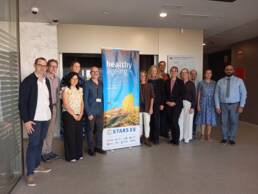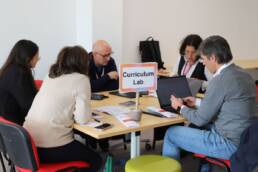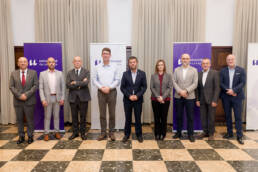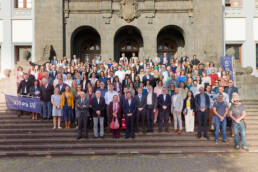The meeting served to strengthen synergies between working groups and develop joint project designs
Researchers from seven of the nine STARS EU universities linked to the TIG on Healthy Ageing met in recent days at the University of La Laguna (Tenerife, Spain) with the aim of exchanging ideas and looking for possible ways of funding for potential research projects. The meeting took place at the facilities of the Institute of Biomedical Technologies and the Faculty of Psychology.
This meeting was coordinated by the professor of the University of La Laguna, Ángel Acebes Vindel, and researchers from the Braganza Polytechnic University (Portugal), Hochschule Bremen (Germany), the Hanze University of Applied Sciences (The Netherlands), the Silesian University in Opava (Czech Republic), the University West (Sweden), and Marie et Louis Pasteur University (France) participated. The meeting held at the University of La Laguna is a working meeting of this group with the aim of promoting their common actions, and is the next one after a first profitable meeting held at a Dutch university.
“This working meeting has served to strengthening synergies between our groups by developing project designs together, discussing about joint research projects to be sent to EU calls in the next months, promoting Blended Intensive Programs (BIPs) and, finally, laying the groundwork for a congress international conference on Healthy Ageing. Undoubtedly, this ULL meeting has been pivotal in consolidating ongoing projects and in boosting future collaborations in our TIG”, said Ángel Acebes after the meeting.
First day
The meeting was opened by several representatives of the alliance at the Spanish university: its general coordinator, José Sigut; the member of the Steering Committee Ernesto Pereda; the deputy director of the School of Doctoral and Postgraduate Studies, Sara Darias; and the aforementioned Ángel Acebes.
Sigut reflected that these face-to-face meetings provide a great boost to joint work, in which progress is made much more quickly in decision-making. For his part, Pereda explained that healthy ageing is a matter of special relevance for Spain, given that it is the second country with the highest life expectancy (83 years on average), only behind Japan. He also took advantage of the working group’s recent success in obtaining a European research project.
During the first day of work there were two plenary sessions: Ángel Acebes spoke about the gait disorders in early stages of Alzheimer’s disease, and Fernando Barragán (ULL) spoke about the psychological and emotional factors of aging, among other issues. A practical workshop on the design of impact projects was also held, led by Gerbrich Myedema, Research and Funding Officer STARS EU TIG-HA. The afternoon ended with a visit to the historic centre of the city of San Cristóbal de La Laguna, coinciding with the switching on of the Christmas lights.
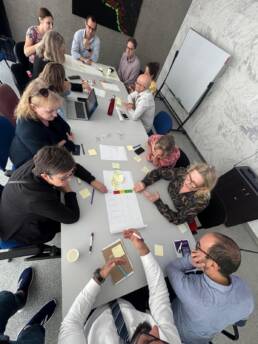
Moment-from-one-of-the-Healthy-Ageing-TIG-workshop
Second day
The second day of work of the Healthy Ageing TIG focused on the presentations that the member universities of STARS EU. The morning opening was given by researchers Yoshimasa Sagawa and Moustafa Fayad, both from the University of Franche Comté-Besançon, who addressed the factors, both intrinsic and extrinsic, that affect home support for the elderly and the detection of the risk of falls through the use of AI.
Next, Hans Hobblen, from the Hanze University of Applied Sciences, focused on the complexity of frailty in old ages, while Masoumeh Helalizadeh, representing the Polytechnic University of Braganza and the University of La Laguna, focused his talk on the role that sleep plays in improving the quality of life of the elderly, It is essential to be able to strengthen defenses and improve immune function, among other benefits.
Ann Svensson, Margareta and Karlsson Rui Pedro Lopes, from University West and the Polytechnic University of Bragança, respectively, explained how they are addressing healthy ageing in research carried out at their universities, while Sabine Lins and Babette Müller-Rockstroh, from the Hochschule Bremen explained how the TIG works.
Marketa Skalna (Silesian University in Opava), was in charge of closing the morning session with her presentation on TIG HA opportunities for students, and gave way to the afternoon conferences, led by researchers from the University of La Laguna Raquel Marín, Agustina Birba and Romaira Yánez, in charge of putting the culmination of this work meeting.
Marín explained how the feeling of emotional discomfort, and even the lack of memory associated with menopause, is ultimately related to the way in which estrogens affect the neuronal membrane and brain fats, so the proposal of the ULL expert consists of carrying out a “neuronutraceutical approach, based on foods capable of feeding the fat in the brain that decreases with the drop in estrogen”.
The second intervention of the afternoon was given by the researcher Agustina Birba, who explained that when neuromotor circuits are affected, language is also affected, so “it is necessary to look for specific linguistic markers for each type of mental illness”. The person in charge of closing this working day was Roraima Yánez, also from the ULL, who focused her intervention on the cognitive connectome in dementia with Lewis bodies and also on healthy aging.
On 14 December 2020, the United Nations (UN) General Assembly proclaimed a Decade of Healthy Ageing (2021-2030). Since then, the World Health Organization has worked in close collaboration with the United Nations to extend health to elderly people and their relatives. In the Stars EU alliance of Universities, the Healthy Ageing TIG has embraced, from the very beginning, the task of adding valuable, healthy years to life.
Related Posts
December 16, 2025
STARS EU strengthens its commitment to teaching innovation with an open call for academic proposals
Proposals may target bachelor’s or master’s programmes at different levels and…
November 25, 2025
The rectors of STARS EU sign at ULL the Europe Campus Charter
The new campus unifies spaces, services and advantages for the entire…
November 25, 2025
Mid-term working meeting of STARS EU begins at the University of La Laguna
The University of La Laguna (Tenerife) is hosting the working meeting to…

